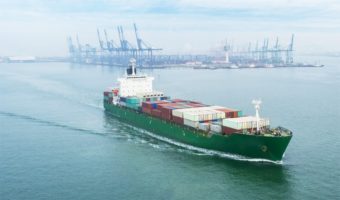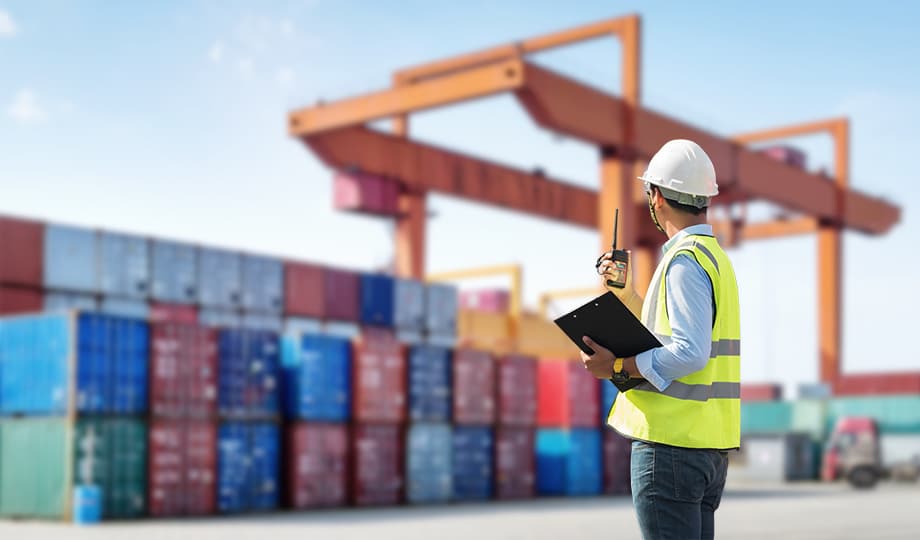Whether you are already working with international suppliers, importing goods and raw materials, or you are expanding the scope of your business globally, exporting your products to the rest of the world, having an AEO for your international logistics will be a great commercial boost.
Grupo Marítima Sureste is listed as an Authorised Economic Operator (AEO) since 2019, in its most restrictive level, that of customs simplification (A.E.O.C.) and in matters of safety and security (A.E.O.S.) resulting in A.E.O.F.
With us, all your export and import operations will be carried out under this certification, simplifying all the necessary procedures.
In short, our services focused on foreign trade are:
- Centralised customs clearance service.
- Qualification of a Temporary Storage Facility.
- Export Customs Bonded Warehouse.
Table of contents
Exporting and importing made easy
If part of your business requires exporting or importing goods, working with a logistics partner that is AEO certified, that follows rigorous internal processes in information integrity management, in the security of the goods and total compliance with customs management regulations, will mean safer and faster foreign trade processes.
Grupo Marítima Sureste has experienced customs representatives in its team, and with A.D.T. and L.A.M.E. qualifications, who carry out all the legal and fiscal procedures necessary for the clearance of your goods.
The Authorised Economic Operator certification, despite being issued by the country of origin, is a worldwide recognition as a mark of quality in international logistics operations.
Our procedures are efficient, safe and reliable.
Would you like to visit our facilities? Our specialised representatives are available to assist you.
International transport
At Grupo Marítima Sureste we provide transport and customs clearance services for the import and export of goods. We use land, sea and air transport to respond efficiently to the needs of our clients.
We also work with all kinds of products, whether they are considered special cargo or dangerous goods. The type of logistics used depends on the cargo to be moved, its volume and weight, the speed of delivery required and the distance to be covered.
Our highly qualified team manages foreign trade operations, from the collection point to delivery in the agreed country.
If you need to contract an international transport service, this is our catalogue:
Airfreight transport services
Airfreight transport services: charter, groupage, hand carrier, cross trade and door to door.
Sea freight transport
Ocean freight forwarding service in FCL or LCL shipping containers, Break Bulk, Ro-Ro or Chartering.
International Road Freight Transport
International road freight transport service with high availability of vehicles and dates.
Key aspects for foreign trade
International trade is a fundamental support for the development of our national economy.
The products that leave the country, with the “Made in Spain” stamp, are undoubtedly a synonym of quality guarantee.
In order to be able to export your products, there are some key aspects that you should know about this process:
You need to have an EORI number
The EORI (Economic Operators Registration and Identification Number) is a number that all economic operators who carry out import and export activities within the European Union must have.
This identification number is requested as a reference by the customs authorities that receive the goods entering each country.
Knowing the INCOTERM of the operation
The INCOTERM is a term derived from the English acronym “International Commercial Terms”. Incoterms are an aspect of international trade activities that define the distribution of responsibilities between the party selling (exporter) the goods and the party buying (importer).
Rephrasing this definition, Incoterms are a series of voluntary regulations that specify the distribution of the costs and duties of each of the parties in the international sale and purchase.
In order to determine the Incoterm, it is necessary to define the place of delivery, the responsibility and the rights of both parties, all of which must be set out in a contract.
Customs documentation
For international trade it is essential to have at hand a copy of all documentation related to the type of goods, purchase invoices and transport forms, in order to keep track of everything related to the operation.
Customs regulations
Another essential aspect of international activity is to be familiar with the regulations of the country of origin and destination, as well as the taxes and duties applied to the type of your products.
Sometimes, using a TSF (Temporary Storage Facility) allows you to store non-EU goods, without clearing them through customs, in order to avoid paying duties and taxes, for a period of no more than 90 days.
Taking out insurance
When it is an international movement, it is recommended to insure the goods, regardless of their nature, against possible mishaps or unforeseen events where they are physically affected or damaged in such a way that they are no longer fit for use or consumption.
Transit insurance will cover any damage to the goods during the journey so that there is no need to worry about a total loss.
Outside the European Union, the rules regarding international trade are not the same, and everything that enters or leaves the European Economic Area requires different procedures and entails different requirements.
For this reason, it is important to be familiar with the situation in the country of destination or origin, in the case of imports, in order to act efficiently and minimise any inconveniences that may arise.
Importing goods
In order to understand international trade, it is essential to clearly define what importing is.
The import of goods is the economic activity of bringing goods from a foreign country, other than one’s own.
In the European Union there is the exception that it is not considered a strict import if the goods come from a country within the European Economic Area. In this case it is considered an introduction or intra-Community acquisition of goods (IAG).
Import process
The international import of goods is made up of a series of procedures, from the moment the company communicates with the customer until the goods arrive at their destination.
Below, we will list these processes:
Negotiation and quotation
The negotiation stage is the first step. It is carried out between the importer and the exporter through a legal document where the specifications of the transaction are set out: the quotation, typology of the goods, the Incoterm, the terms of sale and the company’s information.
Transport of the goods
The international transport has a vital role as the person in charge of moving the goods, and a great deal of responsibility rests on his shoulders.
The transport company plays an important role in the import process, as, in addition to being responsible for delivering the goods to the different country, it is the one who issues the relevant document, depending on the means used: Bill of Lading (B/L), Air Waybill (AWB) or Bill of Lading (CMR).
His activity begins when leaving the warehouse where the goods are loaded, and passing through the customs office of destination. Upon arrival, he must show all the documentation required according to the type of cargo.
The remuneration of this operation would be fixed in the freight and in the origin expenses, justifying the service rendered.
Customs control
Customs clearance in the country of destination is a process carried out by the importer through his representative or customs agent.
In Spain, the documentation necessary to carry out import clearance is as follows:
- Commercial invoice indicating the products and their purchase cost.
- List of contents or “packing list” listing the products.
- Transport document mentioned above (AWB, B/L or CMR).
Customs assesses the risks and the need for inspection, assigning a circuit based on other factors that are not always the same, such as the type of goods, the identity of the exporting company, etc.
The circuits or channels through which your products may pass during clearance are:
- 🟢 The green circuit or channel involves automatic authorisation to withdraw the goods. Most cases pass through this circuit.
- 🟠 The orange circuit or channel involves the review of the documentation provided by the customs representative. Once approved, the release of the goods is authorised.
- 🔴 The red circuit or channel involves the physical and documentary inspection of the goods.
In order to obtain the release of the goods, customs duties will have to be paid based on the TARIC code of the goods, as well as value added taxes. These must be paid before the goods are removed from customs.
Customs Warehousing
In the event that the goods cannot or will not be cleared once they arrive in the country of destination, it is possible to transfer them to a customs warehouse or a temporary storage facility, under the custody of a company authorised by the Tax Agency, so that they can be cleared in the future.
Export of goods
The export of goods refers to the economic activity of sending goods to a foreign country for commercial purposes and using different means of international goods transport, such as air, land or sea transport.
On the other hand, the export of goods is an extremely important economic branch for the internationalisation of companies, because it offers them the possibility of taking their product to any country.
Export process
Having seen the procedure for an import, the procedure for an export from Spain is very similar, but in reverse.
We can summarise the export process in these steps:
- As with imports, the export process begins with the closing of the commercial agreement. This occurs when both companies, from different countries, coordinate the conditions of sale and delivery.
- Formalisation of the agreement by means of an international sales contract. In addition, the exporter and the importer will have to fix the Incoterm of the operation.
- The producer must produce and prepare the goods according to the standards required by the buyer. Afterwards, the goods must be properly packed, following the requirements of both countries, the country of origin and destination.
- Designation of the carrier(s). Depending on what has been agreed in the Incoterm, one of the parties must assign the transport company for international logistics. In international transport, several agents are normally involved in each of the journeys made by the goods:
- 1st route – Collection of the goods at the exporter’s facilities, or at the Authorised Premises for Export Goods, and subsequent transfer of the cargo to the airport or maritime terminal.
- Stowage and loading of the goods inside the means of transport, whether it is a plane, train or cargo ship.
- 2nd route – International journey by land, air or sea. If more than one means of transport is required, it is considered multi-purpose transport.
- Unloading of the goods on arrival by the stevedoring company.
- 3rd route – Delivery of the goods at the importer’s facilities.
- Customs clearance, both on departure and arrival.
- Before the goods leave the country of origin, the corresponding customs formalities and export clearance will be carried out.
- Once the goods arrive in the country of destination, import clearance is carried out to confirm the origin of the products and the protocol requirements of the shipment.
Once all these points have been passed, the goods are delivered to the customer.
Services for international trade
Grupo Marítima Sureste offers your company a whole series of services to guarantee your foreign trade:
- Customs agents
- Authorised customs premises
- International land transport
- International maritime transport
- International air transport
If you would like to obtain a quotation for any of these services, please do not hesitate to contact us.

